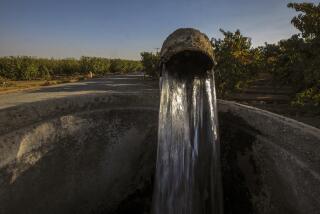Farm Irrigation May Be Curbed
- Share via
In a surprise move Monday, state water authorities proposed restricting agricultural practices that contribute to nitrate contamination of ground water.
The Regional Water Quality Control Board, meeting in Ventura, said heavy agricultural irrigation drives nitrates from fertilizers into the ground water below. Large concentrations of nitrates can be fatal to infants and have been linked to cancer.
“The biggest offender is agriculture,” said Larry Zarian, a member of the Los Angeles board. “If we are really worried about water quality, and agriculture is the biggest offender, we need to do something about it.”
The board directed its staff to write a new rule aimed at reducing nitrate contamination caused by agriculture. That rule would be incorporated into a proposed regulation on septic tanks, which also contribute to nitrate contamination by allowing liquid waste to percolate through the soil and into ground water below.
The board is expected to vote on the regulation at its August meeting.
The proposal drew an indignant reaction from Ventura County agriculture officials, who said they did not receive advance notice that the board intended to discuss the issue.
“I haven’t ever talked to anybody who can tell me what our contribution is, if, indeed, we have a direct contribution,” Rex Laird, executive director of the Ventura County Farm Bureau, said of the nitrate contamination.
Laird said any regulation would be unnecessary, because most growers in Ventura County already use the minimum water possible. Laird said that if the board acts, it would be the first time regulations are imposed on growers’ irrigation practices.
“I would be curious to know how they intend to regulate nitrate contamination if they don’t know the source of the problem,” Laird said.
He said the water board should wait to impose any regulations on nitrate contaminators until the end of the year, when the United Water Conservation District will have completed a study. That study is designed to show the source of ground-water contamination in the El Rio area, where the presence of nitrates has prompted county health authorities to close eight drinking-water wells.
Some officials suspect that septic tanks and agricultural irrigation practices are responsible for the contamination there. Septic tanks are systems that catch waste materials from the home that are either poured down the drain or flushed down the toilet. Solids are separated into the tank and liquids are allowed to drain into the earth, percolating down through the soil into ground water. The tanks are supposed to be flushed out periodically.
It was the controversy over septic tanks that brought the water board to Ventura for a public hearing.
The board proposes to limit the number of new septic tanks by prohibiting them on any lots smaller than two acres. Lots ranging from two to five acres would be required to install sewer pipelines that could be hooked up later to a central sewer system.
At Monday’s public hearing and in letters to the water board, Ventura County officials protested the proposed rule, saying it would unnecessarily restrict septic tanks in areas where no ground-water contamination had been found.
The county also asked for exemptions from the septic tank rule for developers who have already been given permission to subdivide their property.
Robert Ghirelli, the general manager of the water board, said the board will likely accept the county’s proposals.
By the next board meeting on June 18, Ghirelli said, the staff will develop interim requirements. That way, developers can move forward on building plans without waiting until August, when the board is expected to adopt the regulation.
However, he said it is unlikely that he could have a draft regulation on agriculture water prepared any time soon.
“This is a problem that has been ongoing for 20 years. We are not likely to solve it in a month,” he said.
More to Read
Sign up for Essential California
The most important California stories and recommendations in your inbox every morning.
You may occasionally receive promotional content from the Los Angeles Times.













